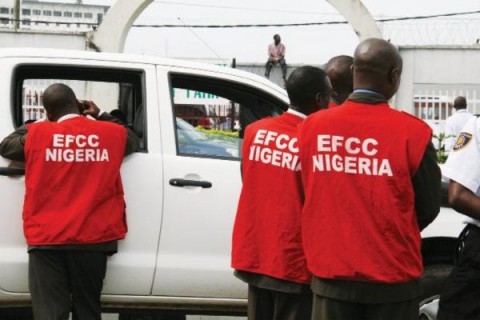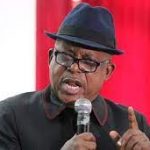Opinion: Winning The War On Corruption
Articles/Opinion, Latest Headlines Sunday, August 30th, 2015
By Adewale Kupoluyi – The nation’s quest for development and a just society may continue to be elusive until the virus called corruption is eliminated from its system. And at the epicentre of this daunting task is the intellectual, who is capable and well equipped as an agent of social engineering, in bringing about the desired change.
This observation was made by a Professor of Sociology of Law in the Department of Sociology, University of Jos, Etannibi Alemika, the Guest Speaker at the 1st Professor E. O. Akeredolu-Ale Memorial Lecture, held in Abeokuta, Ogun State titled, “Roles of Intellectuals in National Development and Promotion of Human Security”. The lecture was held in honour of late Professor Ekundayo Akeredolu-Ale, an author, social commentator, an alumnus of the Nigeria’s Premier University of Ibadan, the London School of Economics (LSE), as well as the former Director, Centre for Social Policy and Research Professor, Nigerian Institute of Social and Economic Research (NISER).
I have decided to share the public lecture not only because I was invited to the occasion but due to the fact that I agree with the Guest Speaker on many of the issues raised and the need to seriously consider his suggestions in our quest to winning the war on corruption. Profesor Alemika, an expert in criminal justice reform, security governance, is a board member of several professional and academic organisations including the CLEEN Foundation (formerly Centre for Law Enforcement Education), the African Civilian Policing Oversight Forum (APCOF), Altus Global Alliance and a member of the American Society of Criminology and Academy of Criminal Justice Sciences. He was recently appointed by President Muhammadu Buhari as a member, Presidential Advisory Committee on Anti-corruption.
The Guest Speaker, who had described Professor Akeredolu-Ale as his teacher, mentor and friend, noted that he was one of the pioneer sociologists in Nigeria, a man of extra-ordinary intellect, scholarship, devoted to the advancement of national development and with “a reputation for thoroughness, hard work, critical and creative thinking but ‘harsh’ in his uncompromising demand for excellence from himself, students and colleagues”, having served as his (Professor Akeredolu-Ale’s) rapporteur at various meetings and seminars, organised for the conduct of research and dissemination of results.
Professor Alemika observed that there were contrasting views on the attributes of intellectuals. For the idealistic view of intellectuals, they possess various virtues and competencies like rationality, objectivity, neutrality, critical thinking and analysis of phenomena or realities, diagnosis and solution of critical problems affecting humanity, freedom of thought and action, critical engagement and opposition to persons in authority and power including their policies and actions, and revolutionary change agents. These and other attributes of intellectuals equip them to speak the truth to power. He, however, noted with dismay that in reality, an intellectual often fails to exhibit some or many of these attributes.
While comparing and contrasting the intelligentsia with the intellectual, the Don said the former referred to persons in society with high educational attainment and professional skills who occupy high position within the public, private and cultural organisations and are generally involved in governance, policy making and administration, as many writers had been found to use the terms interchangeably. Intellectuals are differentiated from non-intellectuals by their dispositions and activities in the sense that a non-intellectual person, though educated, is passive mentally. Such a person accepts what is taught to him/her uncritically and does not exert himself/herself thinking about different problems over a span of years.
In otherwords, they are not emotionally committed to the intellectual pursuit, do not spend time reading on serious subjects and are incapable of forming an opinion beyond what is obvious to most people maintaining that intellectuals are critical and skeptical but not cynical because critical and skeptical persons often interrogate phenomena, policies and practices before taking position. They hold in abeyance their judgment until after critical inquiry, whereas the cynic rejects ideas and practices without any inquiry into their development, features and purposes. In short, skeptics are guided by reason while cynics are carried away by emotion, he noted.
Professor Alemika admitted that discussion on the roles of intellectuals in society was often characterised by controversies and disagreements because intellectuals were meant to pursue actions that ‘alleviate human suffering’ contrary to the implicit idea that those in power will not be genuinely interested in alleviating the suffering of the powerless. “Unfortunately, in the past three decades, many intellectuals have actively participated in the corruption industry or provide defence for the robbers that plunder the resources of our agencies and associations”, he opined. Therefore, the intellectual – being caught in the web – is expected to be on the side of those suffering! He maintained that intellectuals do not constitute a homogeneous social category in that the roles of the intellectuals are basically contextual and only determined by the political economy in which they find themselves, the class to which they affiliate themselves as well as their consciousness.
On the critical national challenges facing intellectuals, Professor Alemika said Nigeria was negatively affected by economic, political and social problems while the capacity to effectively respond to them was significantly undermined by the contemporary understanding of the orientation and roles of intellectuals in the country. He said the country was still battling with the challenge of the erosion of moral and ethical foundations, ideal values and behaviours, obsessive pursuit of vain glory, excessive materialism and inordinate political ambition that encouraged the manipulation of religious and ethnic sentiments.
“Corruption is the single most critical contemporary threat to development, democracy, and human security in Nigeria. It is responsible for most of the conflicts that are presented in ethnic and religious terms. At the roots of the conflicts is competition for the control of resources that can be misappropriated with impunity. Anticipation of benefit from ill-gotten wealth and control of resources by ethnic and religious entrepreneurs form the basis of support for corrupt and evil rulers in various public and private organisations by persons from their communities. The defence of corrupt rulers in various agencies and associations by their ethno-religious communities inhibits effective enforcement of measures against corruption and impunity”, he stated.
Professor Alemika, while urging Nigerians to de-empasize the inordinate crave for money, said the fall-out of corruption was that development is stunted causing increasing number of citizens to be trapped in poverty, as infrastructure and services are not provided while the existing facilities deteriorate as resources appropriated for the provision and maintenance of such infrastructure and social services were said to have been brazenly looted by a cabal of political and economic criminals that have captured strategic economic, political, socio-cultural and religious positions and resources in the country. On winning the anti-corruption war, the member of the Presidential Advisory Committee on Anti-corruption said, “It is the responsibility of the intellectuals to expose these criminals and articulate effective structural, institutional, legal and policy measures against their crimes”.
He described most institutions and organisations in Nigeria as ineffective and weak because they have allegedly been captured by corrupt rulers to serve their personal ends rather than public goods, saying that the executive, judicial and legislative agencies at federal, national and local levels do not serve the purpose for which they were established, adding that nepotism, another form of corruption, was another major factor responsible for the paralysis of government agencies, revealing that when incompetent people are employed or appointed to occupy strategic positions for which they were not qualified, it often leading to the destruction of the personnel, values, rules and processes of the organisations that were hitherto aimed and required for their effectiveness.
The Professor of Sociology of Law regretted that many intellectuals, who were expected to be apostles of transparency, accountability and integrity had betrayed their calling because the security, judiciary and law enforcement agencies which are critical to the enforcement of law and maintenance of security and order are weak because of corruption and inappropriate political control, blaming the government and private corporate organisations as well as the socio-cultural and religious bodies for the rot. They are weak and dysfunctional because they have allegedly been captured and incapacitated by those he described as ‘powerful criminal networks’ that made them serve private interests of individuals rather than the collective security and welfare of citizens.
Tracing the nation’s historical development, Professor Alemika observed that the economic prospects of the country were very bright in the 1960s but recorded progressive decline due to plundering and mismanagement since the 1970s, recalling that in spite of the huge revenues derived from petroleum products, Nigeria was currently ranked as one of the poorest countries with the lowest per capital income in which majority of the population lived in abject poverty and misery caused by unemployment, lack of access to effective health, shelter, education and other social services, charging intellectuals to propose workable solutions by partnering relevant social groups and forces in ensuring their implementation.
He decried the high level of insecurity and crime in the land, which manifest in the forms of armed robbery, kidnapping, rape, ritual killings, economic and financial crimes, massive corruption, illegal bunkering, money laundering, smuggling of goods, domestic, foreign cyber-crimes, prevalence of ethnic and religious violence, terrorism as well as the political and election-related violence killings. He admitted that these conditions constitute serious challenges to national stability, undermining human development and security and aggravated by lack of good governance by the rulers and weak capacity, as the security agencies fail to undertake appropriate proactive and reactive measures.
As a way out, he suggested that intellectuals should study and propose solutions that can lead to the consolidation of sustainable framework for democracy, economic development and equity, social protection, human development and security. He bemoaned that rather than mentor our youths towards national development and security, many intellectuals recruit them for political crimes, violent conflicts, armed and violent militancy, insurgency and terrorism.
“Until early 1980s, the dominant orientation among intellectuals was that of being change agents, imagining and designing pathways and frameworks for national development. Students and lecturers in that era saw themselves as vanguards of national interests. The campuses of the universities were sanctuaries for Africanists, Marxists, nationalists and progressives. To be called a liberal or a conservative then was derogative”, he stated.
Since the 1980s, the dominant trend among Nigerian intellectuals was to become hand-made for political, economic and traditional power-holders in the country. Significant proportion of the intellectuals under the period had abandoned the country for survival in foreign countries that were previously regarded as neo-colonial and imperialist powers. “Till today, Nigerian intellectuals have not recaptured their early vision of being agents of human development and security in the country rather than entrepreneurs with skills for advancing capitalism and its inherent threats to human development and security. Contemporary Nigerian intellectuals demonstrate increasing indifference to the suffering of fellow human beings and miseries unleashed by bad government, and cultures of corruption and impunity. This development constitutes a betrayal of the responsibility of intellectuals”, he further stated.
He concluded his presentation with a call on intellectuals to deploy their knowledge towards the pursuit, realisation and sustenance of human development and security, rather than be mere participants or accessories to policies and actions that seem to undermine them in the sense that they have the responsibility for knowledge production, partnering with progressive forces in the society to ensure the adoption of evidence-based policies that would enhance human development, security, national unity, identity by guaranteeing good governance, democracy and development.
Reciting Josiah Gilbert Holland’s poem, “God Give Us Men!”; the Guest Speaker and a cross-section of participants at the lecture, extolled the virtues of Professor Akeredolu-Ale, describing him as a disciplinarian, who devoted his energy and resources to applied research and advocacy in the areas of social policy, social welfare and social protection, especially for the elderly, “was not known in vain social and political circles because he was too serious and perhaps as his critics will suggest eccentric. Yet, he was a scholar-patriot, skeptical of the intentions of government policies but did not incapacitate himself from interventions in social development policy making and implementation. He avoided being incorporated and co-opted into toxic, corrupt and criminal power structures and networks in the country”. That is indeed what our intellectuals should be!
Kupoluyi writes from Federal University of Agriculture, Abeokuta (FUNAAB), adewalekupoluyi@yahoo.co.uk, @AdewaleKupoluyi
Related Posts
Short URL: https://www.africanexaminer.com/?p=25309





















